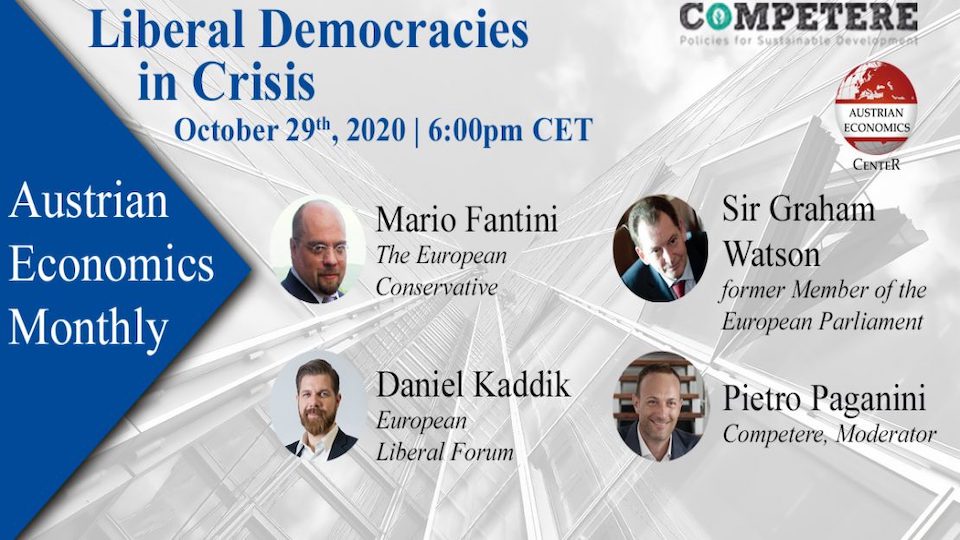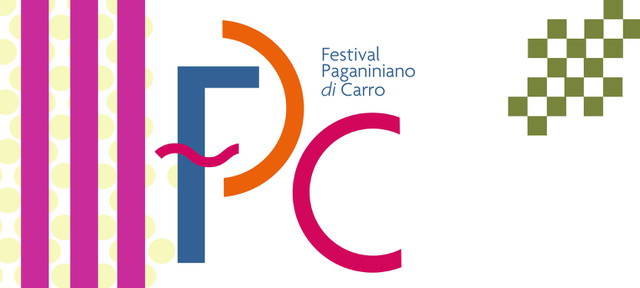The Crisis of Liberaldemocracy – Austrian Economics Monthly – Pietro Paganini
I led the 5th Austrian Economics Monthly Webinar on The Crisis of Liberaldemocracy. An outstanding panel on one of the most critical issue we are experiencing. I have written extensively on the topic.
The Austrian Economics Monthly is a partnership between the Austrian Economics Center and Competere.
Watch the full webinar The Crisis of Liberaldemocracy here>>> o here below
Watch past Austrian Economics Monthly Webinar >>>
THE CRISSI OF LIBERALDEMOCRACY
Majority of citizens in the world today do not trust their political representatives, the mainstream political parties, the established political institutions or their governments. This widespread crisis of legitimacy underlies a series of dramatic changes that have taken place in recent times in the global political landscape. The rise of populist and nationalist parties have been a key focus of concern since, for many of them, there are questions about their political tolerance and their respect for pluralist institutions. Not all populist parties follow the same playbook, however, and some may actually enrich pluralist and liberal democracies.
Most recently, the pandemic has deeply put under pressure liberal democracies. Faith in progress, which is pivotal in the liberal systems, has been hit by the inability of liberal institutions to deliver more wealth and more peace. Trust in scientific, technical and political competence and institutions have been further negatively affected by the disintermediation provided by the digital revolution, which allowed for forms of decoupling between knowledge and power. Covid-19 has illustrated the clash between the perception of time that different stakeholders pertain. The time of economy clashed markedly with the time of the epidemics.
In light of this, what is the future of liberal democracies? How can pluralism emerge again as the core of the public debate?
IF YOU MISS IT, READ IT AGAIN: BUILDING AN OPEN SOCIETY – EL LIBERO (CHILE) >>>
Mario Fantini works as an editor and speechwriter for various international organizations in Brussels, Rome, and Vienna and serves as Editor in Chief of The European Conservative.
Daniel Kaddik is Executive Director of European Liberal Forum in Brussels.
Sir Graham Watson is a former Member of the European Paliament.
Here a short excerpt in bullet points of each speaker.
Daniel Kaddik
- We have enemies, Putin, that people around us do not want to collaborate with liberal democracies. We have taken too much and too many things for granted.
- Liberalist can show the things have got better but we need to explain it better. The success of liberal democracy there is chances for million. We need to communicate better
- Nationalist religious members exploit sentiments of the people and liberals need to find an answer on this issue.
Graham Watson
- Don’t know if it is a problem of communication.
- Starting from cold war, we had a peace dividend where we could have invested in a new social contract. We failed that. In 2008 we had a shock. Now we didn’t recreate a social contract. We are losing the power to make that.
- We are not leaving in a real global world but I little villages. BOWLING ALONE, to global chatroom who thinks the same thing we think (Echochamber)
- We lost element of trust. Truth responsibility understanding and transparency.
- It is too easy for many people to worry about ed of the world, while some is worrying for the end of the month.
- The inequality of wealth and income has led a fundamental crisis in civil society and in the liberal world. WE need a discussion on reestablishing the ability of society to control outcomes and to respond to the need of people. COVID and rapid changes may be an opportunity to do that.
Mario Fantini
- I don’t think there is a crisis of a kind. I don’t share those feeling. Nor I share visions of warning of populism. People are finally yelling in the street trying to reclaim what has been taking away from them.
READ IT AGAIN: CRITICAL THINKING AND PLURALISM (JAKARTA POST) >>>
Daniel Kaddik
- There are different realities that we need to take into account. I have to agree with Mario and graham. It’s not a problem of society the crisis is of the state and bad incentives from which it was created.
- We have bad incentives created by bureaucracies, lost touch with the citizens. The social bubble and the social echo-chamber we created around us. We have preconceptions about each other.
Graham Watson
- Is there a real bubble, deep state forgetting people? I’m not sure that there is a deep state controlling things. Is not happening that
- The market is not working. There is not response to the stimulus. Liberals have to recognize it and we should talk with both sides to form a consensus on a way forward.
Mario Fantini
- It is also a failure of the state. The problem is how do we respond? With what policy?
- A lot of people do not recognize that there is a crisis. I think if we can have the social dialogue.
Daniel Kaddik
- Pietro: The state as we know is a liberal invention. Is the state part of the problem?
- Designed for a king to rule the country. How do we get out of this situation?
- We have to take the form we have and that is the democratic form, we need to bring new ideas, we cannot resort to a sort of new tribalism.
- Conflict is something normal in society. It is something deeply necessary. Debate. Is the only way to go around it. But again, we have survival instinct of certain institutions.
YOU MISSED IT: IN DEFENCE OF LIBERAL DEMOCRACY (THE ECONOMIC STANDARD) >>>
Graham Watson
One of the difficulties with the consumer society is that citizens moved to be consumers. Consumer expects immediate satisfaction from institutions and governments as it expects from shops and the market.
We can start again on how we organize our own society (Adam Smith)
Mario Fantini
We live in a hyperactive society. Yes I believe we have to reassert sovereignty of individuals.
We need to have distorting elements interfering. When a look around I see burocracies, organizations not people discussing.
Here their bios
Mario Fantini
Alvino-Mario Fantini works as an editor and speechwriter for various international organizations in Brussels, Rome, and Vienna. He is also a ‘ghost-writer’ for the free-market PR firm Keybridge Communications in Washington, D.C., and serves as the editor-in-chief of the bi-annual publication,The European Conservative.
He previously worked as Latin America correspondent for Bridge News/Telerate in Bolivia, Chile, and Paraguay; communications officer for the World Bank in Bolivia; editorial consultant at the Far Eastern Economic Review in Hong Kong; and editorial page writer at The European Wall Street Journal in Brussels.
He serves on the boards of European Dignity Watch, an NGO in Brussels, and the Center for European Renewal, an educational non-profit in Amsterdam, and is the former Secretary General of the Hayek Institut. He is a member of the Mont Pelerin Society, the Philadelphia Society, and the Institut d’Études Politiques.
Daniel Kaddik
Daniel is Executive Director at European Liberal Forum in Brussels. The European Liberal Forum is a think tank founded to strengthen the liberal and democrat movement in Europe.
Before that he was Director of the Southeast Europe office of Friedrich Naumann Foundation for Freedom, a non-profit organisation that promotes liberal values, rule of law, and economic freedom. Providing policy consultations and educational programs, the Foundation is active in more than 60 countries.
Having worked previously for the Foundation in Germany, India, and Russia, Daniel Kaddik is actively involved promoting entrepreneurship and personal and political responsibility. His main interest lay in the field of liberal policy solutions, economics and social sciences as well as entrepreneurship and citizen participation in governance.
He received degrees in Governmental Studies from the University of Erfurt, European Studies from the University of Hamburg, and International Studies from the University of Birmingham.
Sir Graham Watson
Graham Watson formerly served as a member of the European Parliament (MEP) and leader of the Alliance of Liberals and Democrats for Europe (ALDE) Group in the European Parliament. During Sir Graham’s tenure as leader, the ALDE group grew to become the the largest third party ever in the European Parliament. He has had a long and distinguished career in European politics and is an expert in European affairs.
Sir Graham was first elected to the European Parliament in 1994 and was the first Liberal Democrat MEP to be elected in the UK. As an MEP, he represented the South West of England for 20 years.
During his political career in the European Parliament he was a member of the Committee for Economic & Monetary Affairs and Industrial Policy and also served on the Budgets Committee for five years. Sir Graham also served as chairman of the Committee on Citizens’ Freedoms and Rights, Justice and Home Affairs. Towards the end of his career in the European Parliament he served on the Foreign Affairs Committee, in addition to his work as a member of the European Parliament’s delegations to China and chair of its delegation to India.






